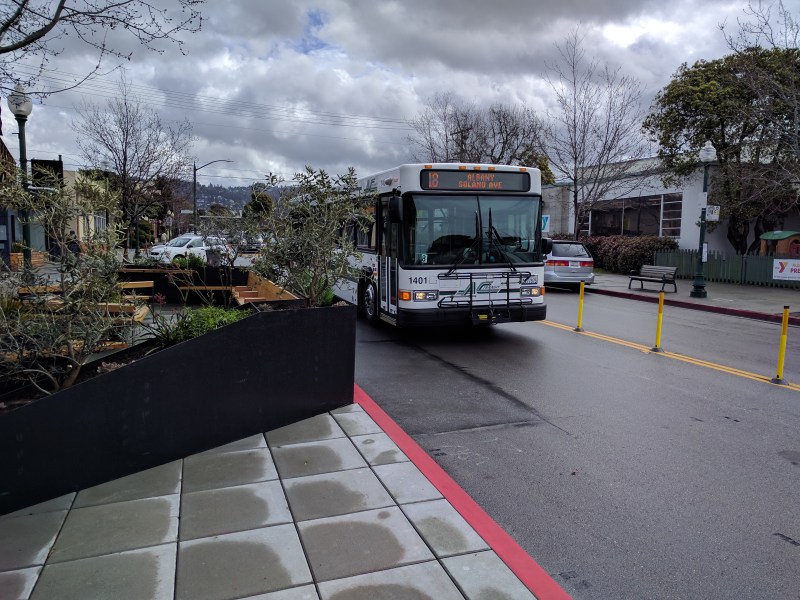A bus stop can be a pole with a sign on it. Or it can be something safe and inviting.
The city of Albany figured out a way to make a bus stop way better--they combined it with a parklet (see lead photo and below).
Stephen Newhouse, who now works for Vancouver, Canada's transit agency, helped put the project together during his time as a planner with AC Transit. He said transit agencies generally don't control the right of way, so it's hard to provide nice bus stops. But "by leveraging public enthusiasm for parklets, transit agencies can achieve priority measures (namely, bus bulbs) with little or no opposition at a fraction of the cost," he wrote in an email to Streetsblog.
As Newhouse explained, this parklet was funded by a Safe Routes to Transit (SR2T) grant and a Kickstarter campaign. "The Kickstarter raised $20,000. AC Transit contributed $25,000 of the SR2T grant for construction," he wrote, adding that the remaining funds are going to develop guidelines for future parklet bus stops.
Meanwhile, Oakland is experimenting with its own bus stop improvements, on Telegraph Avenue. Telegraph is the location of Oakland's first parking-protected bike lane.
However, from the day it opened, there was a problem with bus and bike interactions, since buses still had to cross the bike lane to access the curb.
As a result, cyclists and buses have to jostle around each other at every bus stop, creating a nerve-wracking and dangerous condition.
Oakland plans to install concrete bus-boarding islands, similar to the ones installed in SoMa in San Francisco, when funding becomes available. In the meantime, they are experimenting with plastic bus-boarding islands.
According to Oakland DOT, the plastic islands were put on Telegraph in January in two locations. From OakDOT's post about the installation:
There are two sets of bus stops in the project area — at 24th and at 27th Streets. Currently, buses pull through the painted buffer zone and bike lane to pick up and drop off passengers. This is an interim condition.
The islands are built by Zicla, a company in Barcelona. PeopleforBikes has a great post that breaks down how and where they're used.
As of Friday, however, the boarding islands on 24th are nowhere to be seen. Streetsblog has a request in to find out why and will update this post accordingly.
Also, the northbound bus boarding island on 27th was blocked by a crew working for AT&T--even though they weren't digging in the bike lane. Streetsblog asked the foreman why the "Share the Road" sign and some of the traffic cones were placed in the middle of the bike space.
His reply: that's where he's supposed to put them "to show that it's open."
This highlights an ongoing problem throughout the Bay Area--construction lane-closure guidelines need updating--badly.
According to the Medium post, OakDOT will be doing a "before/after" study of how people respond to the bus boarding islands. Let's hope the study authors will make note of the fact that only one of the four is actually there and fully available for cyclists.
Meanwhile, OakDOT also put down 60-some planters to help delineate and protect the bike path. It seems to work--no scofflaw parkers on the bike lane today!
That may be a first for the Bay Area.






